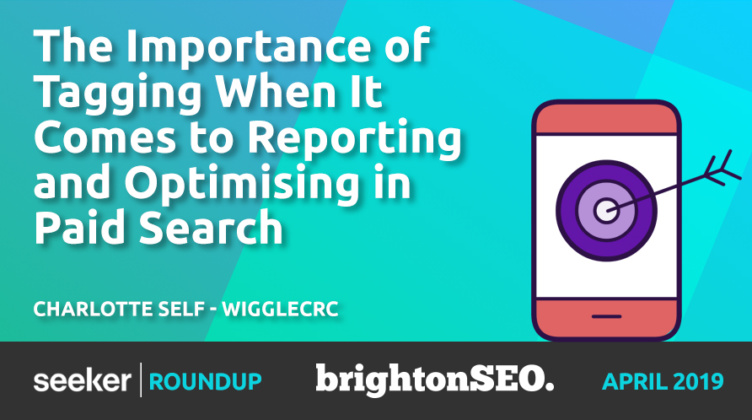
This talk offered actionable insights on how to tag your pages and campaigns, whether it’s for paid search, shopping, or SEO, helping you to enhance your reporting and optimisation with accuracy and clarity.
Overview
- Speaker: Charlotte Self
- Company: WiggleCRC
- LinkedIn profile: https://uk.linkedin.com/in/charlotte-self-1b6995147
The digital age is here and it isn’t slowing down. With data being thrown at us on mass daily, it can be hard to keep on top of it all, separating the useful from the useless. In the world of Digital Marketing, specifically within the avenues of campaign management, organisation of this data is critical when attempting to maximise value through insights gained from this information.
Charlotte Self of WiggleCRC took us through the importance of data and how best to organise it in her seminar titled, ‘The importance of tagging when it comes to reporting and optimising in paid search’ at BSEO April 2019.
What was the talk about?
One of the best things about Digital Marketing in this day and age is the access that we have to large amounts of data. The worst thing about Digital Marketing, well… access to large amounts of data. Essentially, ‘mo data, mo problems’. It can often be hard to see the wood for the trees when dealing with data and this is why it is of great importance that we organise it correctly to derive maximum value.
Charlotte touched on campaign naming structures and how this can be incredibly confusing and often convoluted when working for a large organisation with numerous products to sell and campaigns to facilitate this. A solid campaign name should be simple but detailed enough including the following information:
- Region
- Product name
- Manufacturer
For example, England – trainers – Nike
The benefits of this are that you are able to target specifically, but also pull detailed reports when required, segmenting the relevant data and providing detailed analysis when required. It is about ensuring that everything is tagged up so that you are able to generate what you need as quickly as possible.
By being organised with your data, it makes the task of optimisation a whole lot easier. The more relevant data that you have, the better one can optimise. The less data you have, the less informed your decision making will be. It’s about working smart, not necessarily hard.
Being organised and applying this data to optimising your campaign can be the difference between having a terrible Black Friday versus an awesome Black Friday; for instance, lack of income versus increased income. Beyond this, it will enable you to make informed decisions beyond how you run a campaign, it will give you insights into which products should be pushed, how to structure your team and a host of other external opportunities.
Fave quote
“At the end of the day, data has a lifetime value.”
Key Takeaways
- Keep your data organised.
- Apply your organised data to optimise your campaigns.

